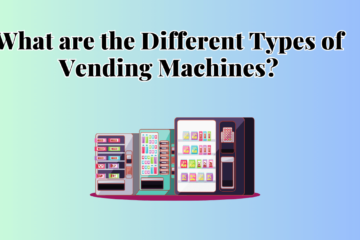In recent years, the vending machine industry in India has witnessed a significant transformation. The emergence of modern technology, changing consumer preferences, and the need for convenience have paved the way for the widespread adoption of vending machines. From offering snacks and beverages to providing essential products, vending machines have become an integral part of daily life. This article delves into the various aspects of how vending is becoming increasingly popular in India, shedding light on the trends and factors that are driving this revolution.
1. The Convenience Factor: Catering to Busy Lifestyles
As the pace of life in India accelerates, the demand for quick and convenient services has skyrocketed. Vending machines offer a seamless and time-efficient way to access products and services. From instant coffee and ready-to-eat snacks at offices to hygiene products at public spaces, vending machines cater to the needs of people on the go.
2. Technological Advancements: Introducing Smart Vending Solutions
The integration of cutting-edge technology has played a pivotal role in the popularity of vending machines. Smart vending solutions equipped with touchscreens, cashless payment options, and real-time inventory tracking have enhanced the user experience. These innovations have not only made vending machines more user-friendly but also increased their appeal to tech-savvy consumers.
3. Diversification of Offerings: Beyond Traditional Snacks
The traditional notion of vending machines being limited to snacks and beverages has evolved significantly. Today, vending machines dispense a diverse range of products, including electronics, personal care items, and even prescription medicines. This diversification has widened the market for vending machines, making them relevant in various industries.
4. Enhanced Product Quality: Meeting Consumer Expectations
In the past, vending machines were often associated with delivering stale or low-quality products. However, advancements in vending technology have ensured the freshness and quality of the products being dispensed. From freshly brewed coffee to healthy snacks, vending machines are now meeting consumer expectations for quality.
5. Penetration in Remote Areas: Access to Essential Goods
India’s vast geographical landscape includes many remote areas with limited access to retail stores. Vending machines have emerged as a practical solution to bridge this gap. They provide a cost-effective way to offer essential goods in remote locations, ensuring that people living in such areas have access to basic necessities.
6. Rising Disposable Income: Embracing Convenience
With a growing middle-class population and increasing disposable income, consumers are more willing to spend on convenience. Vending machines offer a hassle-free shopping experience, where consumers can get what they need quickly and efficiently. This rising disposable income has fueled the demand for vending machines across various demographics.
7. Contactless Transactions: Adapting to the Pandemic
The COVID-19 pandemic prompted a surge in demand for contactless services. Vending machines, with their touchless interfaces and cashless payment options, became a safer alternative to traditional shopping. This adaptability to changing circumstances has further boosted the popularity of vending machines in India.
8. Eco-Friendly Initiatives: Encouraging Sustainable Practices
As environmental consciousness grows, consumers seek out businesses that support eco-friendly practices. Vending machines can contribute to sustainability by offering products with minimal packaging and reducing food waste. Many vending companies are now focusing on eco-friendly initiatives, making their machines more appealing to environmentally conscious consumers.
9. Expansion of Retail Channels: Augmenting Business Opportunities
For retailers and manufacturers, vending machines present a cost-effective way to expand their reach. By placing machines in strategic locations, businesses can penetrate new markets and increase their sales channels. This expansion of retail channels has led to a surge in the number of vending machines across the country.
10. Government Support: Promoting Entrepreneurship
The Indian government has been actively promoting entrepreneurship through various initiatives. Vending machines offer an attractive business opportunity for aspiring entrepreneurs, especially in rural areas. Government support in the form of subsidies and incentives has encouraged more people to invest in vending businesses.
11. Customization and Personalization: Tailoring to Individual Preferences
Modern vending machines are equipped with sophisticated data analytics tools that allow businesses to analyze consumer preferences. By offering personalized product recommendations, vending machines can cater to individual tastes, enhancing the overall consumer experience.
12. Collaborations with Brands: Building Credibility
Vending machine operators are increasingly forming partnerships with established brands. These collaborations not only lend credibility to the products being dispensed but also create brand awareness among consumers. Such tie-ups have contributed to the growing popularity of vending machines as reliable sources of high-quality products.
13. Enhanced Security Measures: Ensuring Consumer Trust
In the past, security concerns deterred some consumers from using vending machines. However, modern machines come with enhanced security measures, such as biometric authentication and tamper-resistant designs, ensuring that users can trust the safety of their transactions.
14. Vending Machine Clusters: Convenience Hubs
Clustering vending machines in high-footfall areas has become a prevalent trend. These vending hubs offer consumers a wide range of products in a single location, enhancing convenience and driving more foot traffic. Vending machine clusters are becoming common in malls, airports, and commercial complexes.
15. Competitive Pricing: Value for Money
Vending machines often provide products at competitive prices compared to retail stores. This affordability appeals to price-conscious consumers who are looking for value for their money. As a result, vending machines have become an attractive option for budget-conscious shoppers.
16. Tapping into the Snacking Culture: Fun and Enjoyment
Snacking has become an integral part of Indian culture, with people indulging in quick bites throughout the day. Vending machines capitalize on this snacking culture by offering a wide variety of savory and sweet treats, adding an element of fun and enjoyment to daily routines.
17. Addressing Space Constraints: Compact and Efficient
In densely populated urban areas, space comes at a premium. Vending machines provide a compact and efficient way to offer goods without requiring extensive floor space. This adaptability to space constraints has made vending machines popular in crowded cities.
18. Digital Marketing and Advertisements: Targeted Promotion
Vending machines offer a unique platform for targeted marketing and advertisements. Businesses can use digital displays on machines to promote their products directly to the target audience. This targeted promotion has proven to be effective in influencing consumer buying decisions.
19. Employability Opportunities: Job Creation
The expanding vending industry has created new job opportunities, ranging from machine maintenance to customer support. As the sector grows, it contributes to employment generation, making it an essential component of India’s economic development.
20. Social Entrepreneurship: Impactful Initiatives
Some vending machine operators are venturing into social entrepreneurship by addressing specific societal challenges. For instance, vending machines that dispense sanitary products in schools promote menstrual hygiene and contribute to social welfare.
21. Technological Localization: Adapting to Diverse Cultures
To cater to India’s diverse population, vending machine manufacturers have adopted technological localization. This includes offering regional language interfaces and incorporating cultural preferences into product offerings.
22. Data-Driven Business Insights: Improving Efficiency
With the data collected from vending machine transactions, businesses can gain valuable insights into consumer behavior and preferences. This data-driven approach helps in optimizing product offerings and improving overall operational efficiency.
23. Health and Wellness Trend: Encouraging Healthy Choices
As health-consciousness rises, vending machines have adapted by offering healthier alternatives. From fresh fruits to organic snacks, vending machines now provide options that align with the health and wellness preferences of consumers.
24. Contactless Delivery: Future Innovations
The future of vending machines lies in furthering contactless delivery methods. With advancements in robotics and artificial intelligence, vending machines may evolve to offer fully autonomous and contactless shopping experiences.
25. Expanding E-Commerce Integration: Seamless Shopping
Some vending machines are integrating with e-commerce platforms, allowing consumers to place orders through their smartphones and collect products from the nearest vending machine. This seamless integration enhances the convenience of vending machine shopping.
FAQs:
Q: How secure are vending machine transactions?
A: Modern vending machines come with advanced security measures, such as biometric authentication and tamper-resistant designs, ensuring secure transactions.
Q: Are vending machines only limited to snacks and beverages?
A: No, vending machines now offer a wide range of products, including electronics, personal care items, and even prescription medicines.
Q: How are vending machines adapting to the COVID-19 pandemic?
A: Vending machines are embracing contactless interfaces and cashless payment options to provide safer shopping experiences during the pandemic.
Q: Can vending machines cater to regional preferences in India?
A: Yes, vending machine manufacturers have localized their technology, offering regional language interfaces and culturally relevant product choices.
Q: Are vending machines promoting sustainability?
A: Yes, many vending companies are focusing on eco-friendly initiatives, such as minimal packaging and reducing food waste, to support sustainability.
Q: How do vending machines contribute to social entrepreneurship?
A: Some vending machines address societal challenges by dispensing essential items like sanitary products in schools to promote social welfare.
Conclusion: Embracing the Convenience Revolution
The rising popularity of vending machines in India is a testament to the changing landscape of consumer behavior and the need for convenience in modern times. From offering diverse products to integrating advanced technology, vending machines are transforming the way people access goods and services. As the industry continues to evolve, the future of vending machines in India looks promising, offering even more innovative and user-friendly solutions.
In conclusion, the widespread adoption of vending machines signifies not just a shift in consumer preferences but also the boundless potential of entrepreneurship and technological advancements in the country. As India embraces the convenience revolution, vending machines are poised to play an increasingly vital role in shaping the retail landscape of the future.




